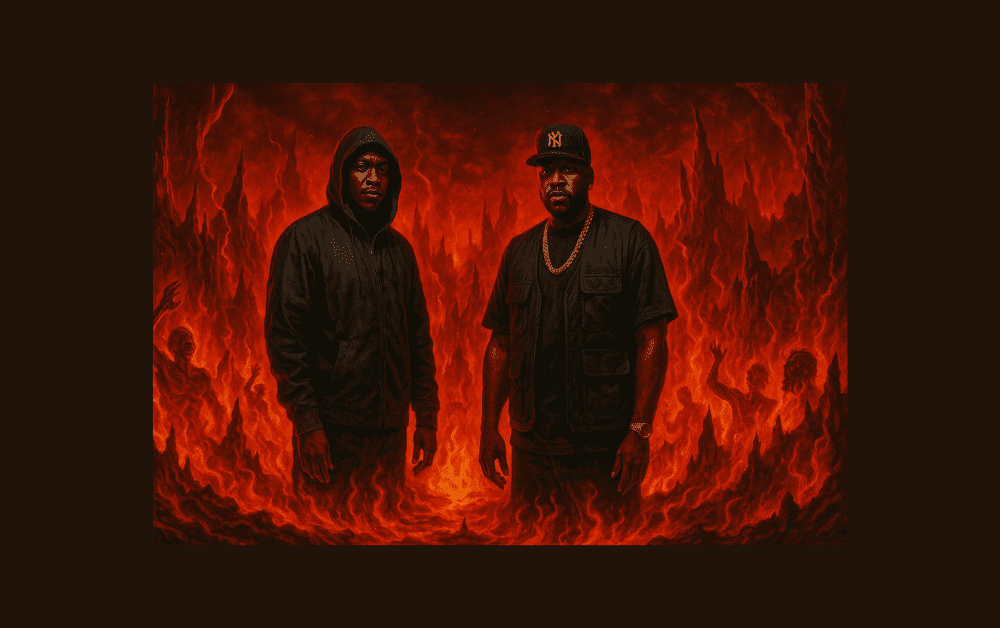
Pusha Preaches, Malice Confesses
After a four-year delay marked by industry limbo, including the dissolution of Arista into Jive and ensuing lawsuits, Clipse finally broke free in late 2006. The duo had been stuck in label purgatory as Jive repeatedly shelved their work, a “situation that the Clipse didn’t put themselves in,” as Pusha T stressed. By the time Hell Hath No Fury dropped on November 28, 2006, it wasn’t just an album; it was a vindictive manifesto born of frustration. “We couldn’t dare come out in the same mind frame as [2002’s] Lord Willin’, so now, we were mad, angry and pissed the fuck off,” Pusha admitted of their mindset. Unsurprisingly, a sense of despair and defiance permeates every track.
Related: Classic Clipse Songs
Neptunes Gone Nordic
Known for their club-friendly hits in the early 2000s, The Neptunes (Pharrell Williams and Chad Hugo) flipped the script here, trading glossy bounce for glacial minimalism. The production on Hell Hath No Fury feels draped in frost, all one-finger synth stabs, eerie echo, and skeletal percussion. Drums clang like metal on metal, and even silence becomes an instrument (as heard when “Wamp Wamp” forgoes traditional drums entirely).
——————————————————————————————————-
——————————————————————————————————-
No Sunshine in Virginia: Neptunes Go Full Grey Scale
The beats are so stripped-back and cold that Rolling Stone marveled, “nobody gets the beats, dry, hard and evil, that Clipse get from Pharrell Williams and Chad Hugo. This austere approach wasn’t by accident: Clipse instructed their producers to push boundaries. “When they work with us, if it ain’t something crazy, we don’t want it,” Pusha told Pitchfork, highlighting their unique chemistry with the Neptunes. Some of these edgy backdrops were initially intended for Jay-Z’s 2006 comeback album, he passed on them, and Clipse eagerly reclaimed the discarded beats albumism.com. The result? A soundscape of wintry, futuristic noir.
From the coin-drop piano plinks on “Ride Around Shining” to the squelching, serpentine keyboards of “Trill,” every beat is both hypnotic and hostile. The Neptunes’ usually bright palette is muted to shades of grey, perfectly mirroring Clipse’s mood. As one reviewer noted, the 12-track production is The Neptunes’ most singular and experimental work, “a storm of sonic inventiveness” where accordions, steel pans, and distorted synths become menacing tools The beats feel like winter personified, beautiful in their sparseness.
——————————————————————————————————-
——————————————————————————————————-
️ Dialect as Doctrine: Words Laid Bare
If the production is ice-cold, Clipse’s lyricism is razor-sharp. Pusha T and Malice (now No Malice) deliver viciously witty, tightly wound rhymes that dissect the cocaine trade and its moral fallout with literary flair. Their verses are packed with chemistry jargon and street slang turned into poetry. For example, Malice boasts, “Pyrex stirrers turned into Cavalli furs,” compressing an entire rags-to-riches narrative (cooking drugs to buy luxury clothes) into a single image. Their trademark wordplay is clinical in precision , alliteration, double entendres, and metaphors that demand unpacking. (On “Wamp Wamp,” they even quip perplexingly, “The Pyrex is Jewish,” one of many cryptic punchlines.
Crucially, Clipse’s slick talk comes laced with conscience. Malice often plays the guilt-ridden narrator to Pusha’s braggart, making their “coke rap” feel more like cautionary scripture. “I’m so sorry, I’m so obnoxious,” Malice apologizes on the hook of “Momma I’m So Sorry,” “my only accomplice is my conscience.”
——————————————————————————————————-
——————————————————————————————————-
Street Gospel: Clipse’s Code of Cold Confession
Such lines underscore the duo’s self-awareness , even as they revel in sin, they’re keenly aware someone (or something) is judging. Critics have noted that dismissing this album as just ‘drug rap’ misses the point. Pitchfork argued Hell Hath No Fury isn’t about glorifying cocaine at all, “it’s “the after shock of a coke sale, infused existence”, with the ugly side-effects (paranoia, distrust, emptiness) laid brutally bare.
In other words, Clipse use the dialect of the streets as doctrine, preaching both the high and the harrowing in equal measure. Every bar is delivered with conviction (punctuated by Pusha’s “Yugh!” grunt). In an era of exaggerated hustler tales, Clipse’s unvarnished honesty and lyrical craftsmanship set them apart, elevating cocaine rap into a form of confessional art.
No Glitter, Just Grit: Drug Rap Reframed
——————————————————————————————————-
——————————————————————————————————-
Where many “trap” records of the mid-2000s celebrated the dealer lifestyle with flamboyance, Hell Hath No Fury takes a starkly different path. Clipse shines a floodlight on the consequences of the game , the weariness, guilt, and dread that lurk behind the glittering façade of drug wealth.
The album’s tone is unremittingly bleak: “Most of Hell Hath No Fury sounds like a bad dream,” one critic observed, “both for the Clipse and for whoever might stand in their way. Instead of upbeat anthems about the come-up, we get ominous tracks like “Nightmares,” a five-minute “cold sweat” of paranoia and regret. Malice’s verses throughout are especially heavy with conscience. On the album’s intro, he pointedly wishes he could have shielded his younger brother from this life: “To my little brother Terrence… If ever I had millions, never would you push blow. Never.”
And on “Hello New World,” after boasting about hustling ingenuity, they include a courtroom skit where “the judge is saying ‘life’ like it ain’t someone’s life,,” a jarring reminder that the game often ends in real life sentences.
——————————————————————————————————-
——————————————————————————————————-
Pyrex and Penance: Malice’s Moral Compass Kicks In
This perspective was nearly unheard of among their rap peers at the time. As Albumism noted, “Momma I’m So Sorry” epitomizes the album’s internal conflict: Pusha flaunts the spoils of crime while Malice seeks absolution, pleading for forgiveness and hoping to steer the next generation away from his mistakes. . Even the standard braggadocio carries a grim undercurrent. On “Ride Around Shining,” each luxury car or Rolex feels less like a flex and more like a target on their backs, dripping anxiety between the lines.
Clipse essentially reframed “coke rap” by stripping out the glamour. What’s left is the raw guilt and existential angst of two men who have “seen the devil in shiny objects” (to paraphrase Malice’s later writings). This unvarnished realism would prove influential you can hear Hell Hath’s weary, no-glitter grit echo in the work of later street poets. The next generation of rappers from Freddie Gibbs to the Griselda camp, clearly took notes, infusing their music with the same mix of hard-boiled hustling and sobering self-reflection that Clipse perfected here. Clipse didn’t just rap about the drug game’s highs; they made its spiritual lows part of the narrative, forever changing the genre’s scope.
Label War, Market Silence, Iconic Echo
Upon release, Hell Hath No Fury confronted a music industry unsure how to handle it. Jive Records infamously fumbled the album’s rollout – perhaps unsurprising, given Clipse delivered no easy radio single and zero club-friendly hooks, only relentless bleakness. (It probably didn’t help that Pusha T outright dissed his label on the lead single, snarling “them crackers weren’t playing fair at Jive,” on a song released by Jive.
With minimal promotion, the record debuted modestly at #14 on the Billboard 200 with 78,000 copies in its first week. Commercially, it wasn’t the juggernaut that flashier rap albums were, no gold plaques, no hit singles beyond the underground. But Hell Hath No Fury swiftly achieved cult classic status, and critics fell over themselves praising its uncompromising vision.
Ten Reasons Hell Hath No Fury Still Slaps in 2025
——————————————————————————————————-
——————————————————————————————————-
| Track | Heat (Vibe) | Why It Matters |
|---|---|---|
| “Mr. Me Too” (feat. Pharrell) | Cold Diss | A snarky, minimalist banger aimed at imitators and industry snakes. Pharrell opens with swagger, and Pusha delivers a scathing reality check: “Sorry to the fans, but them crackers weren’t playing fair at Jive.” |
| “Keys Open Doors“ | Minimal Menace | A study in sonic restraint and street philosophy. The track’s mantra-like hook underscores how coke keys open wealth and danger. Pusha reveals label limbo: “I ain’t spent one rap dollar in three years, holla.” |
| “Wamp Wamp (What It Do)” (feat. Slim Thug) | Frosty Club Hit | Skittering steel drums and a pounding bassline create a carnival-in-a-freezer vibe; a seemingly upbeat party track masking hollow excess. |
| “Ride Around Shining“ | Paranoia Cruise | Luxurious yet paranoid. Flexing that feels “empty” and “spiteful,” hinting at karma’s impending winter. |
| “Momma I’m So Sorry“ | Guilt Letter | A heartfelt apology with bravado. Malice pleads for forgiveness (“my only accomplice is my conscience”), while Pusha remains defiantly proud. |
| “Trill“ | Existential Flex | A hazy, hypnotic Southern-style track dripping with existential dread. Ranked #6 song of 2006 for its oppressive atmosphere and boldness. |
| “Chinese New Year“ | Venomous Solo | The album’s aggressive highlight featuring solo Pusha. Evokes violence chillingly, making breaking-and-entering sound routine. |
| “Dirty Money“ | Cinematic Threat | Ominous and cinematic. A narrative flipping the usual glorification of money into a tale of distrust and corruption. |
| “Nightmares” (feat. Bilal) | Dream-State Fear | Melancholic closer highlighting paranoia and vulnerability. References Scarface and the Geto Boys’ “Mind Playing Tricks on Me,” delivering psychological dread. |
| “Hello New World“ | Skeptical Hope | Triumphant yet wary advice track, advocating caution. Ends with courtroom skit, highlighting harsh realities. |
——————————————————————————————————-
——————————————————————————————————-
Aftermath: Diverging Paths, Enduring DNA
Not long after Hell Hath No Fury, the Thornton brothers’ paths diverged. Malice found religion, adopted the name No Malice, and left his coke-rap persona behind, publishing a memoir and releasing spiritually influenced rap.
Pusha T, meanwhile, leaned deeper into the gritty artistry of Hell Hath, delivering acclaimed solo projects like Fear of God and Daytona, becoming the leading figure in “luxury coke rap.”
Despite different paths, both continued acknowledging Hell Hath No Fury’s impact, performing together sporadically (including Kanye West’s “Use This Gospel”). Now, in June 2025, Clipse has officially announced a comeback album, Let God Sort Em Out, entirely produced by Pharrell Williams. The project promises matured perspectives but retains the duo’s raw storytelling and icy signature style.
Legacy: From Frost to Fire
Final Word
In the end, Clipse achieved something timeless: an album that was worth every bit of the wait and struggle. As listeners, we’re left with a classic that’s as exhilarating as it is sobering, a furious masterpiece that proves sometimes the realest art emerges from the coldest corners of adversity. And with Clipse’s return on the horizon, the icy flame of Hell Hath No Fury only burns brighter.
More by Talmage Garn









